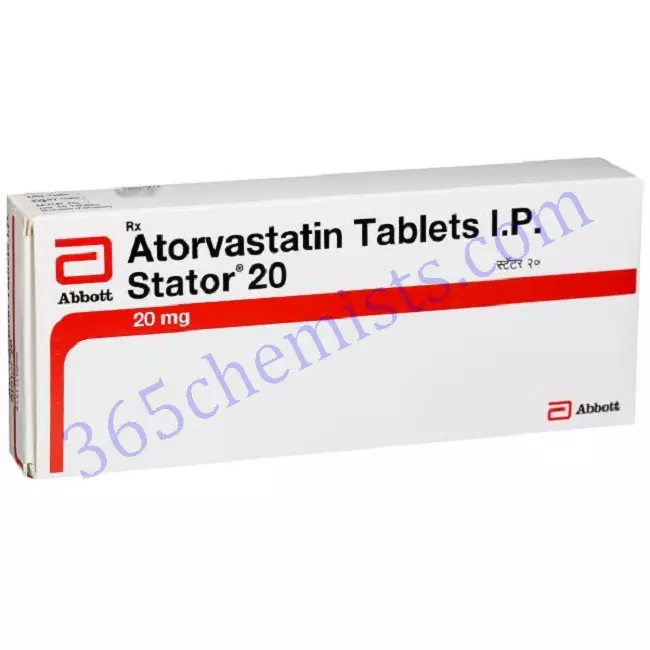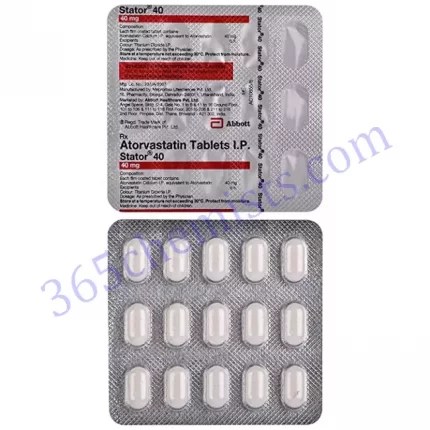INTRODUCTION
STATOR 20MG contains Atorvastatin, which belongs to a group of medicines called Statins. It is used to reduce high cholesterol levels in patients, including those who have certain inherited cholesterol disorders. Cholesterol gets builds up in your blood vessels leading to narrowing of blood vessels resulting in heart attack or stroke. STATOR 20MG is intended to reduce high cholesterol levels and is important to follow diet along with appropriate exercise, while taking medication. If you regularly drink grapefruit juice, talk to your doctor, since it may increase the amount of atorvastatin in the blood. Diabetic patients have to monitor their blood sugar more frequently while taking this medicine.
Before taking this medicine, it is better to let your doctor know if you are suffering from any heart, liver or kidney disease. Ask your doctor for advice before taking any medicine, if you are pregnant, or if you are trying to become pregnant or breast feeding. The common side effects of STATOR 20MG includes headache, nausea, constipation, indigestion, diarrhoea and cold-like symptoms. This medicine has to be taken regularly and exactly as prescribed by your doctor.
USES OF STATOR 20MG
- Used to lower lipids (cholesterol and triglycerides)
HOW STATOR 20MG WORKS
STATOR 20MG works by blocking an enzyme called HMG-CoA which is used to make cholesterol in the liver. When that enzyme is blocked less cholesterol is produced thus reducing the amount of cholesterol in the blood. It lowers the level of total cholesterol and low-density lipoprotein (LDL, or “bad” cholesterol), and raises high density lipoprotein (HDL, or “good” cholesterol) levels.
DIRECTIONS FOR USE
Always take STATOR 20MG exactly as your doctor has told you. It can be taken at any time of day, with or without food. Try to take your tablet at the same time every day.
SIDE EFFECTS OF STATOR 20MG
SERIOUS
- Serious allergic reaction such as swelling of the face, tongue and throat, difficulty in breathing, peeling and swelling of skin and blistering of skin, mouth, eyes genitals and fever, skin rash
- Bleeding or bruising
COMMON
- Inflammation of nasal passages, pain in the throat
- Headache
- Nausea
- Constipation
- Indigestion
- Diarrhoea
- Joint pain, muscle pain and back pain
RARE
- Visual disturbance
- Cholestasis (yellowing of the skin and whites of the eyes)
Feeling sick (nausea) or indigestion:
Try taking this medicine with, or just after, a meal and stick to simple meals and do not eat rich or spicy food.
Headache:
Rest and drink plenty of fluids. Do not drink too much alcohol.
Sore throat:
Try gargling with warm salty water (children shouldn’t try this) or use paracetamol or ibuprofen to ease any pain or discomfort.
Constipation:
Eat fibre rich foods such as fresh fruit, vegetables and cereals, and drink plenty of water. Exercise more regularly, for example, by going for a daily walk or run.
WARNING & PRECAUTIONS
PREGNANCY
STATOR 20 MG is not recommended for use in pregnant women unless necessary. Discuss the risks and benefits with your doctor.
BREASTFEEDING
STATOR 20MG is not recommended for use in breastfeeding women unless necessary. Discuss the risks and benefits with your doctor.
DRIVING AND USING MACHINES
Do not drive or use any tools or machines if your ability is affected by this medicine.
ALCOHOL
Avoid drinking too much alcohol while taking this medicine.
KIDNEY
STATOR 20 MG should be taken with caution in patients with severe kidney disease. Consult your doctor for advice.
LIVER
STATOR 20 MG should be taken with caution in patients with severe liver disease. Consult your doctor for advice.
ALLERGY
Do not take STATOR 20MG if you are allergic (hypersensitive) to Atorvastatin or any other ingredients in this medicine.
LUNGS
If you have severe respiratory failure, you may be more sensitive to the effects of STATOR 20MG. Consult your doctor and he will prescribe the right dose for you.
INTERACTIONS
Tell your doctor if you are taking:
- Ciclosporin (used to suppress immune system)
- Antibiotics or antifungal medicines (e.g. erythromycin, clarithromycin, telithromycin, ketoconazole, itraconazole, voriconazole, fluconazole, posaconazole, rifampin, fusidic acid)
- Gemfibrozil, other fibrates, colestipol and ezetimibe (used to reduce cholesterol)
- Medicine used to treat heart problems like angina or high blood pressure (e.g. amlodipine, diltiazem) and irregular heart rhythm (e.g. digoxin, verapamil, amiodarone)
- Medicines used to treat HIV (e.g. ritonavir, lopinavir, atazanavir, indinavir, darunavir, tipranavir)
- Medicines used to treat hepatitis C (e.g. telaprevir, boceprevir and the combination of elbasvir/grazoprevir)
- Warfarin (which reduces blood clotting)
- Oral contraceptives
- Stiripentol (used for epilepsy)
- Cimetidine (used for heartburn and peptic ulcers)
- Phenazone (used to treat pain)
- Colchicine (used to treat gout)













Reviews
There are no reviews yet.